Yemeni rial
The rial or riyal is the currency of Yemen. It is technically divided into 100 fils, although coins denominated in fils have not been issued since Yemeni unification.
| Yemeni rial | |
|---|---|
| ريال يمني (Arabic) | |
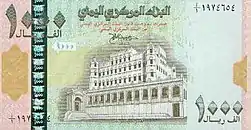 1000 Yemeni rial banknote | |
| ISO 4217 | |
| Code | YER |
| Denominations | |
| Superunit | |
| 10 | dinar |
| Subunit | |
| 1/100 | fils |
| Symbol | ر.ي, ﷼ |
| Banknotes | 50, 100, 200, 250, 500, 1000 rials |
| Coins | 1, 5, 10, 20 rials |
| Demographics | |
| User(s) | |
| Issuance | |
| Central bank | Central Bank of Yemen |
| Website | www |
| Valuation | |
| Inflation | 12.2% |
| Source | 2010 est[1] |
History
In the 18th and 19th century, the riyal was traditionally associated with the Maria Theresa thaler, currency that was widely in use in Yemen owing to the Mocha coffee trade with the French, and a Yemeni request that its produce be paid with thalers.[2]
As Yemen progressed, it developed its own legal currency. After the union between the North (the Yemen Arab Republic) and the South (the People's Democratic Republic of Yemen) in 1990, both the northern rial and the southern dinar remained legal tender during a transitional period, with 1 dinar exchanged for 26 rials. On 11 June 1996, the dinar was withdrawn from circulation. In 1993, the first coins were issued for the Republic of Yemen. The value of the Yemeni rial against the United States dollar dropped significantly compared to 12.01 rials per dollar in early the 1990s. Since the mid-1990s the Yemeni rial has been freely convertible. Though it dropped from YER 20 to approximately YER 215 against the U.S. dollar since then, the rial has been stable for several years. However, since 2010 the Central Bank of Yemen had to intervene several times, resulting in a serious decline of foreign reserves. By late 2013, the Economic Intelligence Unit expects reserves to decline to approximately 1.3 months of imports over the following years, despite information that Saudi Arabia would transfer $1 billion to the Yemeni Central Bank.[3][4] Due to the war, the exchange rate for the Yemeni rial has hovered between 470 and 500 Yemeni rials for 1 US dollar.
Coins
When Yemen unified, coins had been issued in North Yemen in denominations of 1, 5, 10, 25 and 50 fils and 1 rial. The fils denominations have all disappeared from circulation. In 1993, new coins were introduced by the Central Bank of Yemen in denominations of 1 and 5 rials. These were followed by 10 rials coins in 1995 and 20 rials in 2004.
| 1 rial | 5 rials | 10 rials | 20 rials |
|---|---|---|---|
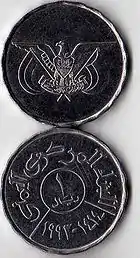 |
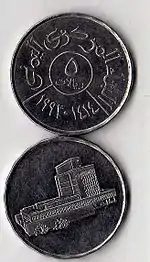 |
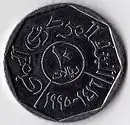 |
.jpg.webp) |
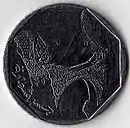 |
.jpg.webp) |
Banknotes
At the time of unification, Central Bank of Yemen notes in circulation were 1, 5, 10, 20, 50 and 100 rials. In 1993, the 1 and 5 rials notes were replaced by coins, with the same happening to the 10 rials notes in 1995. In 1996, 200 rials notes were introduced, followed by 500 rials in 1997 and 1000 rials in 1998. The 20 rials notes were replaced by coins in 2004. In addition, a 250 rial banknote was issued on November 14, 2009.[5][6] In 2017, the Central Bank of Yemen, now relocated in Aden, its interim capital due to the civil war, issued 500 and 1,000 rials banknotes with revised security features and different size dimensions. In 2018, the Central Bank of Yemen reintroduced the 200 rials banknote and has issued a new 100 rials banknote.
| Currently circulating banknotes (1994-2009) | |||||||
|---|---|---|---|---|---|---|---|
| Image | Value | Main Colour | Description | Date of | |||
| Obverse | Reverse | Obverse | Reverse | Printing | Issue | ||
 |
 |
50 rials | Olive-green | Bronze statue of Ma'adkarib, ancient king of Haram | Shibam city, Hadramaut | 1994 | |
 |
 |
100 rials | Purple | Ancient culverts, Aden | Sana'a | 1993 | |
| 100 rials | Red and violet | Dragon's blood tree, Socotra | Agricultural terraces | 2018 | |||
| 200 rials | Green | Alabaster sculpture | Mukalla | 1996 | |||
| 200 rials | Yellow | Zabid fortress, Al Hudaydah Governorate | Landscape, Al Mahrah Governorate | 2018 | August 2018 | ||
| 250 rials | Orange & blue | Al-Saleh mosque, Sana'a | Mukalla | 2009 | November 14, 2009 | ||
 |
 |
500 rials | Blue | Dar al-Hajr (Palace of the Rock) | Al-Muhdhar Mosque, Tarim | 2007 | |
| 500 rials | Blue | Al-Muhdhar Mosque, Tarim | Dar al-Hajar | 2017 | |||
 |
 |
1,000 rials | Green & yellow | Seiyun Palace, Hadhramaut | Bab al-Yaman gate, San'a | 2009 2012 2017 |
August 2010 |
| Current YER exchange rates | |
|---|---|
| From Google Finance: | AUD CAD CHF EUR GBP HKD JPY USD INR CNY |
| From Yahoo! Finance: | AUD CAD CHF EUR GBP HKD JPY USD INR CNY |
| From XE.com: | AUD CAD CHF EUR GBP HKD JPY USD INR CNY |
| From OANDA: | AUD CAD CHF EUR GBP HKD JPY USD INR CNY |
| From fxtop.com: | AUD CAD CHF EUR GBP HKD JPY USD INR CNY |
See also
References
- The World Factbook
- Ghalib bin Awadh al-Qu'aiti, The Maria Theresa Thaler in Hadhramaut: Some Reflections, The British-Yemeni Society
- BTI 2014- Yemen Country Report
- Ghalib bin Awadh al-Qu'aiti, The Maria Theresa Thaler in Hadhramaut: Some Reflections, pub. by: The British-Yemeni Society
- Yemen new 250‑rial note confirmed, BanknoteNews.com. Retrieved 2011-09-06.
- BanknoteNews.com Retrieved 2011-09-06.
Sources
- Krause, Chester L.; Clifford Mishler (1991). Standard Catalog of World Coins: 1801–1991 (18th ed.). Krause Publications. ISBN 0873411501.
- Pick, Albert (1994). Standard Catalog of World Paper Money: General Issues. Colin R. Bruce II and Neil Shafer (editors) (7th ed.). Krause Publications. ISBN 0-87341-207-9.
External links
| Preceded by: South Yemeni dinar Location: South Yemen Ratio: 1 dinar = 26 rials Note: Use of the Yemeni rial started in 1990, Yemeni dinar was withdrawn from circulation in 1996. |
Currency of Yemen 1990 – |
Succeeded by: Current |
| Preceded by: North Yemeni rial Location: North Yemen Ratio: at par |